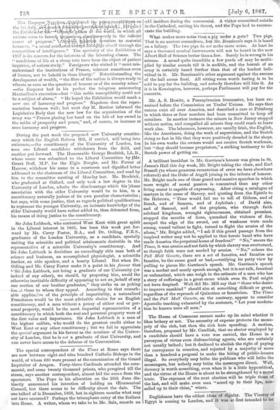A brilliant breakfast in Mr. Garrison's honour was given in
St. James's Hall this day week, Mr. Bright taking the chair, and Earl Russell (to whose generous recantation of error we have elsewhere referred) and the Duke of Argyll joining in the tribute of honour. Mr. Bright made one of those grand and massive speeches in which more weight of moral passion is concentred than any other living orator is capable of expressing. Alter citing a catalogue of martyrs in the cause of Slavery, and quoting from the Epistle to the Hebrews, " Time would fail me to tell of Gideon, and of Barak, and of Samson, and of Jephthah ; of David also, and of Samuel, and of the prophets, who through faith subdued kingdoms, wrought righteousness, obtained promises, stopped the mouths of lions, quenched the violence of fire, escaped the edge of the sword, out of weakness were made strong, waxed valiant in fight, turned to flight the armies of the aliens," Mr. Bright added, "I ask if this grand passage from the inspired writer may not be applied to that heroic band who have made America the perpetual home of freedom?" "No," sneers the Times, it was armies and not faith by which slavery was overturned, as though faith were not needed by armies. " No," echoes the Pall Mall Gazette, these are a set of fanatics, and fanatics are fanatics, be the cause good or bad,—verifying its petty view by pulling to pieces Mr. Garrison's speech. Mr. Garrison's speech was a modest and manly speech enough, but it is not talk, fanatical or unfanatical, which can weigh in the estimate of a man who has a story of sufferings in a great cause which even St. Paul might not have despised. Well did Mr. Mill say that " those who desire to improve mankind" should aim at something difficult or great, regardless of the reproach of Quixotism or fanaticism. The Times and the Pall Mall Gazette, on the contrary, appear to consider Apostolic teaching exhausted by the sentence, " Let your modera- tion be known unto all men."






























 Previous page
Previous page